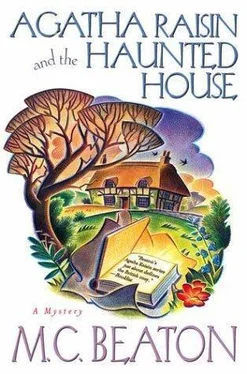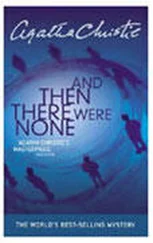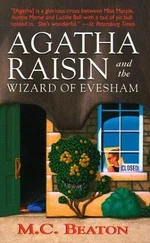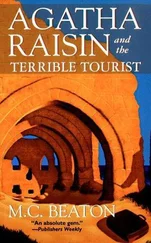The expensive block of service flats she had been staying in-expensive mainly because they allowed pets-had boasted a gym and Agatha had made good use of it. Her waist was trim and her stomach flat-well, nearly. She changed into a pair of sky-blue shorts and a blue-and-white gingham blouse and walked along to the post office-cum-general stores to buy groceries.
She was paying for the groceries when she noticed a bundle of local papers on the counter. The headline on the top one said: OWNER OF HAUNTED HOUSE FOUND DEAD. Agatha bought a copy and hurried home with it. She stacked away her purchases and settled down at the kitchen table to read the story.
Mrs. Witherspoon had been found by her daughter lying at the bottom of the stairs with her neck broken. Daughter Carol Witherspoon, aged sixty-seven, of Holm Cottage, Ancombe, said that she had not heard from her mother and became worried because her mother usually phoned her every Friday. She had let herself into her mother’s house with her key and had found her dead. Mrs. Witherspoon had reported to the police on several occasions that her home was haunted. Agatha pushed the paper away and sat deep in thought. The staircase, she remembered, had been carpeted, and the stairs themselves, shallow.
Of course something or someone might have frightened Mrs. Witherspoon so much that she had lost her footing. Even so, how did she manage to break her neck? She had shown no signs of suffering from brittle-bone disease. Her back had been ramrod-straight.
The doorbell rang. Agatha went and opened the door and looked up into Paul Chatterton’s black eyes. “Oh, it’s you,” she said weakly. “Come in.” She peered round him. “Where’s your wife?”
“Gone back to Spain.”
“Oh.” Agatha walked ahead of him into the kitchen. He noticed idly that she had long smooth legs, not a varicose vein in sight.
“You’ve lost weight,” he said.
“There was a gym at the flats I was staying at. I used it as much as possible. Coffee?”
“You’ve forgotten. Tea, please.”
Agatha plugged in the kettle. “Would you do me a favour, Paul? Just before I left I bought four decent garden chairs. They’re stacked at the shed in the bottom of the garden. Here’s the key. Could you bring out two of them?”
“Sure.” He took the key and headed off out into the garden to a rapturous welcome from the cats.
Agatha made tea for him and coffee for herself and carried both into the garden to where Paul had set up two garden chairs with comfortable cushioned seats and backs.
“Did you have time to read about Mrs. Witherspoon?” he asked. “I find it all very odd.”
“So do I,” said Agatha, suddenly happy. “What are we going to do about it?”
AGATHA Raisin listened to her conscience, which was currently telling her not to have anything further to do with Paul. The rest of her mind was just glad to see him. Not for a moment would she admit to herself that she dreaded loneliness. She prided herself on being a self-sufficient woman. She only knew that she was glad that he was back, glad his wife was in Spain, and glad that the investigation had started up again.
“The problem,” said Paul, “is where to begin.”
“There’s the daughter,” said Agatha. “She lives over at Ancombe. But it’s too soon after her mother’s death to go calling.”
“I wonder when the funeral is,” said Paul. “I’d like to see who turns up for it. Now the daughter didn’t like her mother, so a call from us wouldn’t shock her or upset her. We can just say we’re friends of her mother and that we would like to pay our respects at the funeral.”
“We could do that. I’ll get the phone book.”
“Better if we call in person.”
“I know, but I’ll get the phone book and find out her address.”
Agatha came back after a few minutes. “I’ve written it down. She lives at Four Henry Street. I know Henry Street. It’s in a council estate at the far end of the village.”
“No time like the present. Let’s go.”
“I’d better change.”
“Pity,” he murmured, eyeing her legs.
“Are you a flirt, Paul?”
“Just an appreciative comment.”
Agatha went upstairs and changed into a long summer skirt, remembered him looking at her legs and changed into a short one, thought that might look as if she was giving him a come-on, and changed back into the long skirt, worried that it looked frumpy, and put on a blue linen dress with a medium-length skirt, redid her make-up and finally went downstairs.
“You were ages,” complained Paul. “I nearly went up to look for you.”
“I’m here now,” saw Agatha, reddening slightly under his gaze.
“So let’s go.”
Most of the council houses on the estate had been bought by the residents from the government, and to advertise their new homeowning status, some had added “picture” windows and fake Georgian porticoes. Number Four, unlike its neighbours, had a neglected air. The garden was weedy and the front door and window frames were badly in need of fresh paint.
Paul pressed the bell and then knocked on the door. “I don’t think the bell works,” he said.
The door was opened by a large, bony woman with grey hair. A strong smell of whisky emanated from her and her faded blue eyes were red-rimmed and watery.
“What?” she demanded.
“We were friends of your late mother,” said Paul. “We wondered whether you could tell us the time of the funeral so we could pay our last respects.”
“I don’t know. Ask Harry. He’s in charge of arrangements.”
“Who’s Harry?”
“My brother.”
“Where can we find him?” asked Agatha.
“Oh, come in. I’ll write the address for you. He’s over in Mircester. I haven’t seen him in years.”
They followed her into a dingy living-room. Agatha’s sharp eyes noticed a half-empty whisky bottle and glass behind a chair. Carol went over to a table by the window and began to search among a pile of papers until she found a notebook. “Here it is,” she said, opening it. “ Number Eight-four Paxton Lane.” She scribbled the address on a piece of paper and handed it to Paul.
“When did you last see your mother?” asked Agatha.
“You mean before I found her dead?”
“Yes.”
“The Saturday before that. I always went over on Saturdays, God knows why. All I ever got was a mouthful of abuse. Did Harry go near her? You bet your life he didn’t. Didn’t give a monkey’s for her and yet she leaves it all to him.”
Carol began to cry, tears rolling down her face and cutting channels in the thick make-up she was wearing. They waited in awkward silence until she finally blew her nose and wiped her eyes. “Mother never forgave me for leaving,” she said. “Wanted me to stay there like a slave. Well, I showed her!”
“Were you ever bothered by the hauntings your mother was complaining about?” asked Agatha.
“No. I think she dreamed all that up to try to get me to go back and live there. I feel sick about the whole thing. I’ve got to go to the inquest.”
“When’s that?” asked Paul.
“Mircester Coroner’s Court tomorrow at ten in the morning. How come you’re friends of hers? She didn’t have any friends.”
“We called on her to help lay her ghosts,” said Paul.
“Then you’re fools. There weren’t any ghosts. She was my mother, God rest her soul, but she was a nasty old bitch.”
“So that’s where we’ll go tomorrow,” said Paul. “It’ll be interesting to see who turns up at the coroner’s court.”
“Aren’t we going to see this Harry?”
“He’ll be there tomorrow.”
“But we might not get a chance to speak to him,” said Agatha.
Читать дальше
